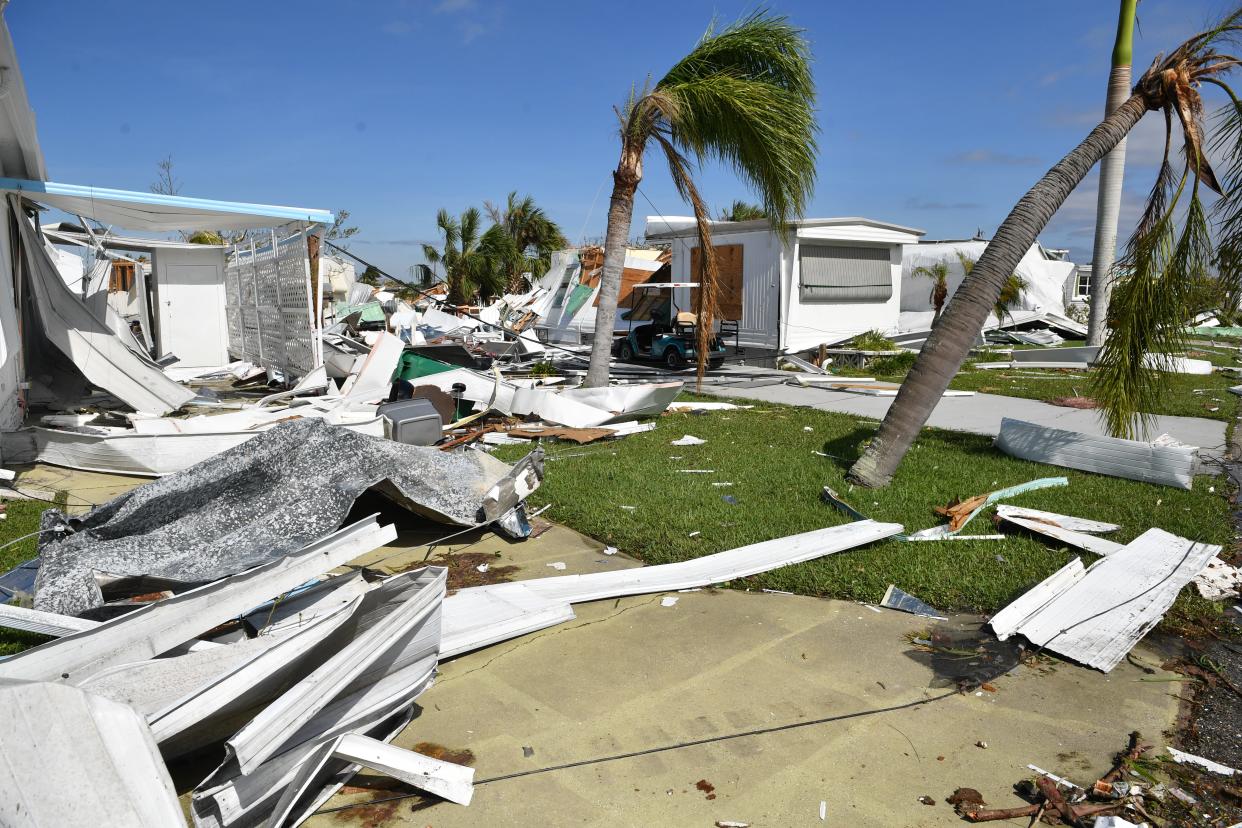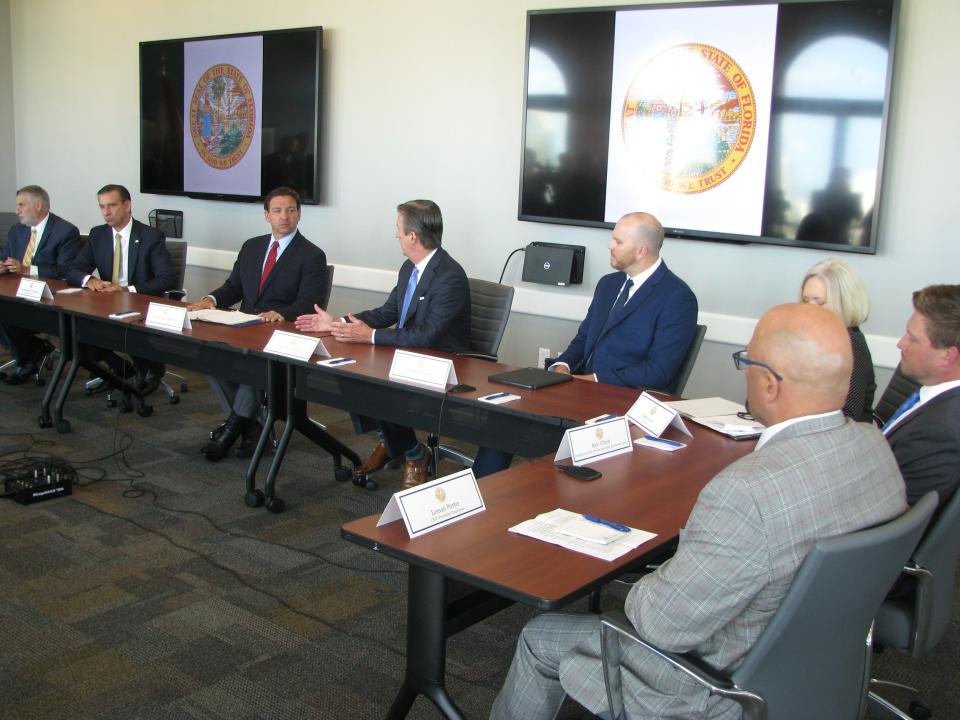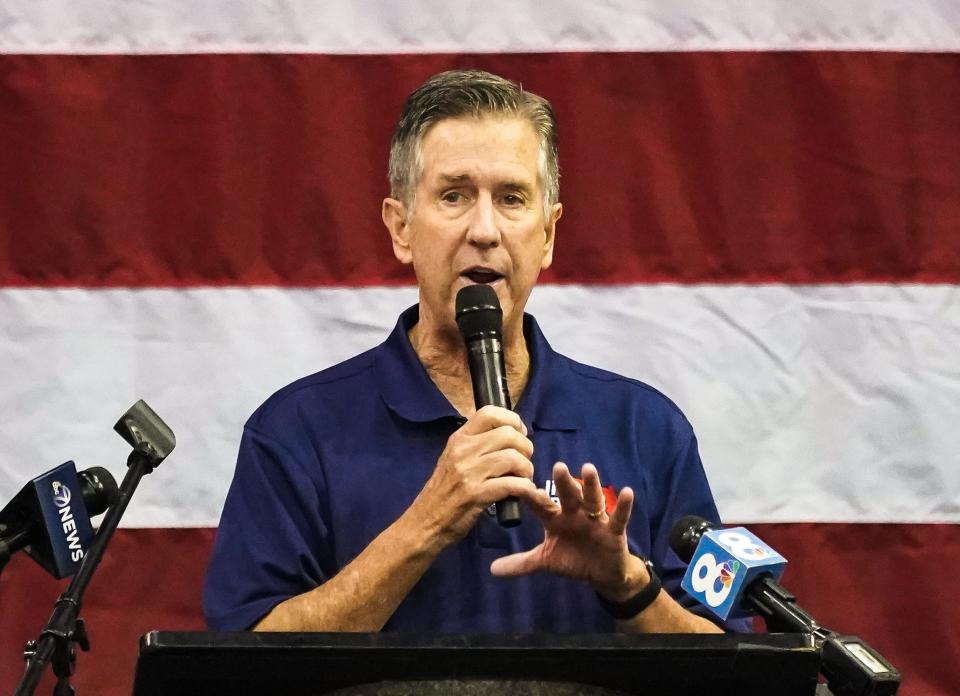Why are Insurance premiums in Florida rising faster than anywhere in the country?

Weeks ago, James Benko received notice that his family's homeowners insurance premium would increase from $5,000 a year to $10,000.
The roof was replaced in 2019. He replaced the windows and doors when he purchased the property last year and he has not made an insurance claim.
He's been asking insurance brokers how the insurance costs could be going up so much for his house in Sarasota's Palmer Ranch.
"They can't give me a reason for why it went up 100%," he said.
He's spoken with more than a dozen insurance brokers, searching for someone offering a "fair deal."
Benko and countless other homeowners have discovered the painful reality of a collapsing property insurance market where nearly 10 insurance providers have folded and had their policies absorbed by the state's "insurer of last resort" — Citizens Property Insurance — in the last two years.
The number of policies for the state-backed insurance company has nearly tripled in four years, swelling from about 419,000 state-backed insurance policies in April 2019 to 1.2 million in April 2023.
The publicly owned Citizens Property Insurance asked for rate increases of 13.1% on Thursday. Citizens Property Insurance President and Chief Executive Tim Cerio said reserves had fallen by 33% and that if a moderately strong hurricane strikes Florida this year, all insurance policies in the state would likely see additional surcharges to cover the costs.
Previous coverage: Slow response by Citizens leaves Ian-damaged South Venice home vulnerable to storm season
More: After Ian: Thousands of Sarasota County residents remain stranded; local groups offer hope
Meanwhile, other property owners have been receiving eyepopping rate hikes from their private insurance providers. The highest insurance quote Benko received during his search was a $44,000 quote from Lloyd's of London.
"I had to laugh at that one," he said.
Benko has until June 30 to decide which company he'll use.
Rising insurance threatens Florida's affordability
The escalating market is causing more than financial woes.
Steven W. Thompson, a condo association lawyer, said he witnessed a condo owner take a swing at an insurance broker at a condo board meeting after being told premiums would increase by 50% next year.
"He said he couldn't pay it," Thompson said of the owner in a Manatee County condo building.
Others are questioning whether Florida is really the affordable paradise they were sold on when they moved here, especially as climate scientists predict more frequent and powerful hurricanes in the future.
Harry Moser owns a condo unit at The Landings west of Tamiami Trail and north of Phillippi Creek.
"The insurance costs are making us reconsider Florida," he said.
Insurance was $2,000 per unit in his building in 2021, $3,000 a unit in 2022, and now set to hit $7,000 per unit.
"If this crisis is not resolved soon, people will be bailing out of Florida," he said.
Michael Mailliard, owner of MIC Insurance on Longboat Key, said insurance companies have increased rates from 20% to 100% across the board.
He said that isn't likely to get better before recent changes to state law aimed at reducing lawsuits over insurance are fully implemented, which will be sometime in about a year and a half.
Florida lawmakers have stepped in repeatedly over the past year with legislation trying to attract more private carriers to the state known for its costly storms.
Mailliard said these reforms were driven by arguments that costly litigation was driving up rates. He pointed to statics that Florida accounted for 9% of the nation's property insurance claims, but 79% of the nation's property insurance lawsuits. But some of the changes came late, he contended.
"We were already dead in the ditch before they did anything," he said.
"In 2021, just two out of the 40 (insurance) companies made a dollar," he said. "Thirty-eight out of 40 companies took money out of assets to stay afloat."
More costly storms complicate business
Part of the problem has been attributed to hurricanes causing widespread devastation, making it difficult to charge reasonable rates while remaining capitalized to cover insurance losses when storms like last year's Hurricane Ian affect a broad area.
"No company in the world has enough cash to cover Florida storms," Mailliard said. "So, these companies are buying reinsurance to fully reinsure their wind risk."
Herald-Tribune columnist's take: SEIDMAN SAYS: The high cost of ignoring Florida’s insurance crisis
The problem for insurance companies in 2023 is that companies that offer reinsurance have pulled back on how much they will offer to Florida insurance companies.
Mailliard said that in 2023 there is a $50 billion hole in the reinsurance market in Florida. This has resulted in companies raising rates and searching out the least risky properties to insure.
During two special sessions in the past year, the Republican-controlled Legislature steered $3 billion in taxpayer money into reinsurance accounts the industry could tap.
Mailliard said that a $3 billion increase in reinsurance doesn't spread far when there's a $50 billion hole.
Lawmakers also have added new barriers preventing customers from suing their insurance companies when unsatisfied with claim outcomes.
Despite the reforms coming later than he would have liked, Mailliard said he expects them to have a significant impact and help steady the state's shaky property insurance market.
Still waiting
Gov. Ron DeSantis and Republican leaders in the Legislature embraced claims by industry officials that lawsuit abuse is driving rates and keeping many companies out of the Florida market.
DeSantis drew heat from outnumbered Democrats in Florida for his approach.

But even former President Donald Trump, who polls show leads the field for the Republican presidential nomination DeSantis also is seeking, blasted the Florida governor for what he called on social media, “the biggest industry BAILOUT to Globalist Insurance Companies, in HISTORY.”
Such attacks caught the governor’s attention, and helped prompt Republican leaders in the Legislature this spring to approve an insurer accountability bill that would increase fines for poor claims-handling by companies and add some consumer safeguards. DeSantis signed the measure last month.
Steps also have been taken by lawmakers to force customers out of Citizens and into private coverage if they get an offer less than 20% more expensive.
Not everyone has bought the argument that lawsuits are the driving factor in the rapid rate increases Floridians have experienced in home insurance premiums over the past two years.
They point to similar legislative reforms in June 2021 that then had minimal to no immediate effect on the insurance markets. DeSantis touted that bill in Sarasota at a signing event where he acknowledged the insurance industry's challenges, but that he expected the changes would help.
State Sen. Jim Boyd, a Bradenton Republican, went even further at the 2021 bill signing, guaranteeing rate decreases for Floridians.
“It will drive costs down… it’s going to be a year to 18 months for this to filter through the system and for rates to start to really realize the impact of what we’ve done," Boyd said at the time. "But it is for sure going to happen and I’m excited, because without a viable, competitive homeowner’s market it effects so many parts of our economy that would be in trouble without it.”

More than two years later, Florida insurance premiums continue to increase faster than anywhere else in the country, according to LexisNexis Risk Solutions data.
Critics often point to what they describe as fundamental problems surrounding the industry's reliance on reinsurance, the siphoning of profits to loosely connected subsidiaries and generally low capitalization rates that leave insurance companies perpetually vulnerable to severe hurricanes.
"We think that insurance fraud is quite bad and should be stopped at every turn, but we also think blaming the entire crisis on fraud is inaccurate," said Michael DeLong, a researcher with the Consumer Federation of America. "Fraud contributes to the crisis, but it is not the overwhelming cause. Combating fraud won’t fix everything.”
DeLong said the real driver of premium increases is climate change. He said the insurance industry has begun to factor climate factors and scientists' conclusions that those factors are producing larger and more intense storms into their pricing models, which show more risk in Florida, resulting in higher premiums for consumers.
“It’s a serious problem, that can only be overcome through the Office of Insurance Regulation, the Florida Legislature and governor taking an active role in trying to stop the crisis.” he said.
Insurers reassessing risk
DeLong said more mitigation programs that would help property owners most impacted by climate change could stave off future insurance losses.
Those programs can involve upgrading older homes to modern building codes, raising the elevation of homes in flood plains and preventing homes from being built in flood plains in the future, DeLong said.
Those programs would be costly and require government funding and focus, he noted.
He also said requiring insurance companies to have higher capital thresholds could help prevent insurance companies from failing every time the state finds itself in the path of a large hurricane.
He proposed some form of a stress test for insurance companies in Florida, similar to the stress tests financial firms must undergo by federal regulators.
Kelly Rush, the director of the Home Vertical for the data and information company LexisNexis Risk Solutions, agreed that climate change is likely the main cause, but also did not downplay the impact the recent changes in state law will have going forward.
He pointed to abnormally high inflation and several large storms — including Hurricane Ian — hitting Florida in recent years as part of the current "complex" problems in Florida's insurance market.
Reinsurers have also experienced large losses on the global market, which impacted the availability of reinsurance in Florida, he said.
"Reinsurers have definitely reassessed the risk in Florida," he said.
Benko, the Palmer Ranch property owner, isn't optimistic as he prepares to absorb a substantial hit to his home budget.
"I feel like I'm being penalized for something I have nothing to do with," he said.
This article originally appeared on Sarasota Herald-Tribune: Relief out of sight as Florida's collapsing insurance markets continue to see increases

